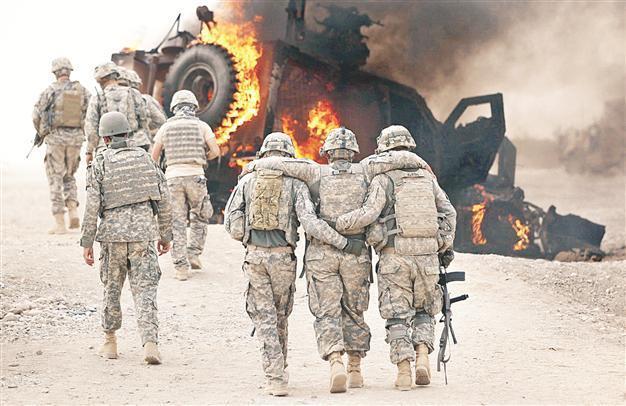Attacks on foreign troops in Afghanistan sparks debate
KABUL

A US soldier with an injured ankle from the Army is assisted past his burning armored vehicle after it struck a roadside bomb near Nolen, Afghanistan. REUTERS photo
An Afghan police officer killed at least 10 of his fellow officers Aug. 11, a day after six U.S. service members were gunned down by their Afghan partners in growing scenes of summer violence that has both international and Afghan forces questioning who they can trust.Attacks on foreign troops by Afghans working in partnership with the alliance are on the rise, while cases of Afghan security forces killing members of their own ranks grow less frequent. These types of incidents show how battle lines in the country have blurred in the decade-long war.
Assaults on international service members have stoked fear and mistrust against Afghan allies, threatening to hamper the U.S.-led coalition’s ongoing work to train and professionalize Afghan policemen and soldiers. The attacks also raise questions about the quality of the Afghan forces that have begun to take charge of security in many areas of the country as U.S. and NATO combat troops prepare to withdraw from Afghanistan by the end of 2014.
Coalition officials say a few rogue policemen and soldiers should not taint the overall integrity of the Afghan security forces. They claim the attacks have not impeded plans to hand over security to Afghan forces, which will be 352,000 strong in a few months. But growing unease between international troops and their Afghan partners is something Taliban insurgents are happy to exploit. Shakila Hakimi, a member of the Nimroz Provincial Council, said the policeman who opened fire on his colleagues at a checkpoint in Dilaram district is believed to have had ties to militants, Associated Press reported.
‘Lack of trust’
A day earlier, two Afghans shot and killed six American service members in the neighboring Helmand province in the country’s south, an area where insurgents have wielded the greatest influence. Attacks where Afghan security forces, or insurgents disguised in security uniforms, kill foreign troops have spiked as of late, with four such attacks occurring in the past week. There have been 26 such attacks so far this year, according to the U.S.-led coalition.
So-called green-on-blue attacks, in which Afghans turn their weapons against their foreign allies, have killed a total of 34 international soldiers this year, according to a NATO count. “Clearly as far as the future partnering and training and mentoring of Afghan forces by NATO and the U.S. is concerned, it is going to have a very negative effect and the lack of trust between the two sides is going to grow,” said author and analyst Ahmed Rashid. “NATO will have to impose new security measures for its own troops when they are dealing with Afghans or training Afghans, which will put even more distance between the two sides,” Rashid told Agence France-Presse.
Some of the attacks have been claimed by the Taliban, who say they have infiltrated the ranks of Afghan security forces, but many are attributed to cultural differences and antagonism between local and U.S.-led allied forces. “What we identified was that most of them were caused by personal grievances and stress situations,” chief spokesman for NATO’s International Security Assistance Force, Brig-Gen Gunter Katz, said.
Afghan President Hamid Karzai condemned the latest killings and ordered investigations into the incidents. He has also directed the relevant Afghan authorities to work to ensure officers’ safety within training and security institutions. “The enemy who does not want to see Afghanistan have a strong security force, targets military trainers,” Karzai said in a statement.
















